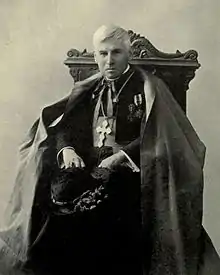Francis Bickerstaffe-Drew
Francis Bickerstaffe-Drew CBE, KHS, better known as John Ayscough and born Francis Browning Bickerstaffe,[1][2] (11 February 1858 – 3 July 1928) was a British writer[3] and Roman Catholic priest.
Monsignor Francis Bickerstaffe-Drew | |
|---|---|
 | |
| Born | 11 February 1858 |
| Died | 3 July 1928 (aged 70) |
| Nationality | British |
| Occupation(s) | Cleric, author |
| Religion | Roman Catholic |
| Ordained | 1884 |
| Title | Rt Rev Msgr |
Biography
Born in Headingley, Leeds, the younger son of Harry Lloyd Bickerstaffe, an Anglican cleric, and Elisabeth Mona Brougham Drew, the daughter of Pierce Drew of Heathfield Towers, Muckridge, Youghal, County Cork, Ireland.[4] He had one sibling, an elder brother, Pierce.[5]
In 1878, he converted to Roman Catholicism, while an undergraduate at Pembroke College, Oxford. Bickerstaffe-Drew was ordained as a Catholic priest in 1884 and served as a chaplain in the British Army for more than thirty years. He was made a private Papal Chamberlain by Pope Leo XIII in 1891 and by Pius X in 1903, was a member of the Pontifical Chamber of Malta.[6]
Bickerstaffe-Drew died in Salisbury, England on 3 July 1928, aged 70.
Distinctions
- Honorary degree from the University of Notre Dame
- Honorary degree from the Marquette University
- Knight of the Order of the Holy Sepulchre
- Pro Ecclesia et Pontifice (1901)
Works
- Oremus: or, Little Mildred (1880).
- Dominus Vobiscum: or, The Sailor Boy (1880).
- Veni Creator; or, Ulrich's Money (1881).
- Pater Noster; or, An Orphan Boy (1881).
- Per Jesum Christum: or, Two Good Fridays (1881).
- Ave Maria; or, Catesby's Story (1882).
- Credo; or, Justin's Martyrdom (1882).
- Ora Pro Nobis (1883).
- Marotz (1908).
- Mr. Beke of the Blacks (1908).
- Dromina (1909).
- A Roman Tragedy and Others (1909).
- San Celestino (1909).
- Outsiders—and In (1910).
- Mezzogiorno (1911).
- Hurdcott (1911).
- Faustula N. A.D. 340 (1912).
- Gracechurch (1913).
- Levia-pondera: An essay book (1913)
- Monksbridge (1914).
- Prodigals and Sons (1914).
- French Windows (1918).
- Jacqueline (1918).
- The Tideway (1918).
- Fernando (1919).
- Abbotscourt (1920).
- First Impressions in America (1921).
- Discourses and Essays (1922).
- Mariquita (1922).
- Pages from the Past (1922).
- Dobachi (1923).
Selected articles
- "Isolation and Federation," The American Ecclesiastical Review (1913).
- "A Dog and a Bad Name: Some Notes on the Novel and its Present Function," The American Catholic Quarterly Review (1913).
- "Picture Teaching," The American Catholic Quarterly Review (1914).
- "A Novelist's Novel-Reading," The Catholic World (1915).
Short stories
- "A Beginning—At Railham," Part II, Part III, The Catholic World (1913–1914).
- "The Sacristans," The Catholic World (1915).
References
- Halkett, Samuel & John Laing (1956). Dictionary of Anonymous and Pseudonymous English Literature. New York: Haskell House Publishers, pp. 135, 169.
- Room, Adrian (2010). Dictionary of Pseudonyms: 13,000 Assumed Names and Their Origins. Jefferson, N.C.: McFarland & Company, Inc., p. 40.
- Keller, Leo W. (1920). "John Ayscough, Novelist," The Catholic World, Vol. CXI, pp. 164–173.
- Burnand, Sir Francis Cowley (10 June 1908). "The Catholic Who's who and Yearbook". Burns & Oates – via Google Books.
- Gorman, W. Gordon (1910). Converts to Rome. London: Sands & Co., pp. 23, 33.
- "The Rt Rev Msgr Count Francis Bickerstaffe-Drew, LL.D.," The Notre Dame Alumnus, Vol. VII, No. 1, September 1928, p. 16.
Further reading
- Adams, J.R. (1922). "The Modern Catholic Novel," The American Catholic Quarterly Review, Vol. XLVII, pp. 130–135.
- Bickerstaffe-Drew, F. (1919). John Ayscough's Letters to his Mother during 1914, 1915 and 1916. New York: P.J. Kenedy & Sons.
- Braybrooke, Patrick (1931). "John Ayscough; Priest and Novelist." In: Some Catholic Novelists: Their Art and Outlook. London: Burns, Oats & Washbourne, Ltd.
- Gerrard, Thomas J. (1911). "The Real Romance of Life," The Catholic World, Vol. XCIII, No. 553, pp. 1–16.
- Martin, Arthur A. (1915). A Surgeon in Khaki. London: Edward Arnold.